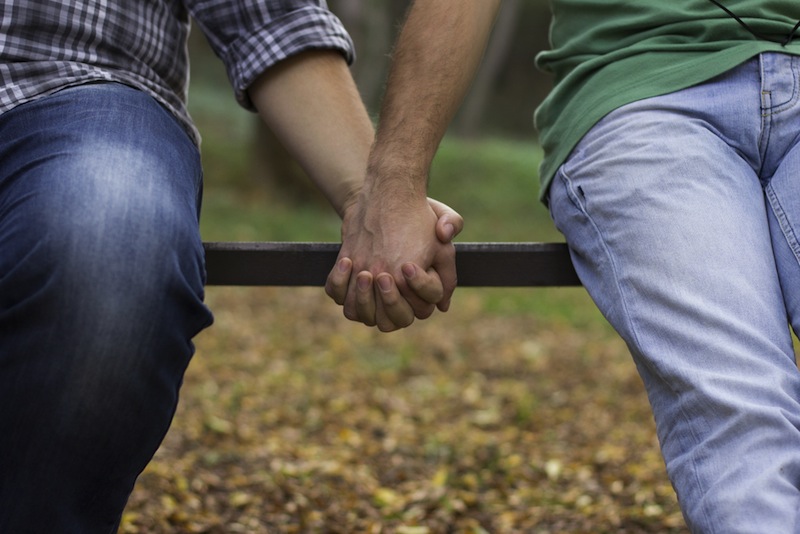Americans Support Legal Rights, But Not PDA, for Gay Couples

Many Americans support legal rights for gay and lesbian couples but still don't think those couples should kiss in public, a new study suggests.
Over the past two decades, same-sex couples have made great progress in terms of legal rights in the United Sates. Gays and lesbians can now get married in 33 states and the District of Columbia, after a U.S. Supreme Court ruling last month cleared the way for same-sex marriages in Indiana, Oklahoma, Utah, Virginia and Wisconsin. And yet, the new research shows that deep-rooted prejudices against same-sex couples may manifest themselves in more subtle ways.
The experimental survey revealed that heterosexual people are equally supportive of legal benefits for same-sex couples and heterosexual couples, but are much less supportive of public displays of affection (PDA) for same-sex couples than for heterosexual couples. [10 Milestones in Gay Rights History]
Perhaps more surprisigly, the study revealed that some gay and lesbian people were more supportive of heterosexual PDA than they were of same-sex PDA. The results seem counterintuitive at first, but gays and lesbians are much more likely to be victims of harassment or hate crimes. The lack of support for same-sex PDA is likely out of concern for safety, study lead author Long Doan, a doctoral candidate at Indiana University, told Live Science.
In the new study, more than 1,000 volunteers (male and female, gay and straight) read a short story about a gay couple, a lesbian couple or a heterosexual couple who were living together but were not married. After reading the scenario, each volunteer answered questions about what they thought of the couple. Questions included whether the couple should be granted legal rights, such as hospital visitation, health insurance and inheritance rights. Other questions included how acceptable it was for the couple to tell people they are in a relationship, or to engage in PDA, such as holding hands, kissing on the cheek or French kissing.
Heterosexual participants generally supported same-sex legal rights; for example, they were almost equally in favor of inheritance rights for heterosexual, gay and lesbian couples (with 70 percent, 69 percent and 73 percent in favor, respectively). But heterosexual study participants were pretty negative across the board about granting some informal privileges to gay and lesbian couples, Doan said. Of the study participants who read the scenario about a heterosexual couple, 95 percent approved of the couple kissing on the cheek. For comparison, just 55 percent approved of a gay couple kissing on the cheek, and 72 percent approved of a lesbian couple kissing on the cheek.
The gay and lesbian volunteers were generally positive about these privileges, except for PDA. That's why Doan and the researchers think the lack of support for same-sex PDA is related to safety concerns. The results also showed that people were more tolerant of lesbian PDA than gay PDA. This could be more evidence that research on same-sex attitudes and prejudices should not lump gay couples and lesbian couples into the same category, Doan said.
Sign up for the Live Science daily newsletter now
Get the world’s most fascinating discoveries delivered straight to your inbox.
The findings fit in with a growing body of research that explores modern prejudice — the term psychology and sociology researchers use to describe the more subtle prejudices and racist attitudes that still persist after legal rights are granted to various racial groups, sexual orientation groups or genders. Doan's research addresses the difference between old-fashioned gay prejudices that are rooted in long-held religious beliefs and moral objections and modern prejudices that are more nuanced.
Doan also noted that while heterosexual people were generally supportive of gay and lesbian legal rights, they were still largely unsupportive of same-sex marriage. (Indeed, a Gallup poll in May found that 55 percent of Americans are in favor of same-sex marriage. That's the highest level of support Gallup has ever seen, but it shows how divisive the issue still is.) This discrepancy suggests that heterosexual people view marriage as an open display of commitment and affection (a privilege) rather than a contract solidifying a partnership (a legal right), Doan said. Gay and lesbian people, on the other hand, are more likely to view marriage as a legal right.
The research appears in the December issue of the journal American Sociological Review.
Follow Kelly Dickerson on Twitter. Follow us @livescience, Facebook & Google+. Original article on Live Science.

Why is yawning contagious?
Scientific consensus shows race is a human invention, not biological reality










